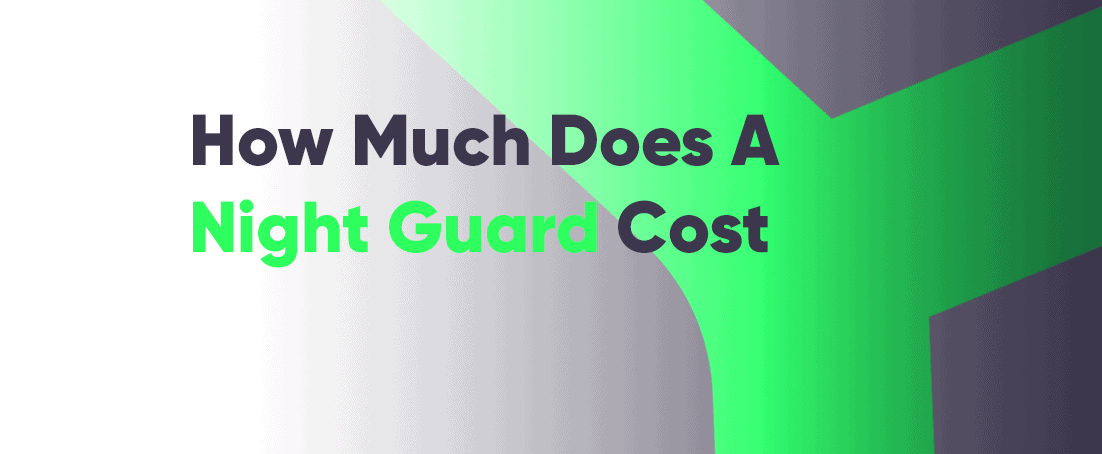
The problem many face when considering a night guard for dental protection is the ambiguity of pricing. A dentist-grade night guard can soar well above a thousand dollars, making it a significant investment. On the other end of the spectrum, inexpensive mouth guards from e-commerce platforms like Amazon often come with questions about their reliability.
The discrepancy in cost leaves potential buyers puzzled about what teeth guards are best and how much they should actually spend for this purchase. This article aims to serve as a comprehensive guide to unravel how much does a night guard cost.
The Main Types of Night Guards
We must start by covering the main types of Night Guards as the price highly varies on the type.
Stock Night Guards are ready-made and can be purchased off the shelf. These teeth guards are generally inexpensive but offer a one-size-fits-all approach that may not meet the needs of most. They are mass-produced and therefore lack the customization that could provide a more comfortable and effective fit.
Boil and Bite Night Guards are also available off-the-shelf but allow some degree of customization. You boil the guard in water and then bite into it, allowing the material to mold to your teeth. It provides a better fit than stock options and in some cases, and with proper care can be quite durable.
Custom-Fitted Night Guards crafted by a Dentist specifically for your dental structure. These require a visit to the dentist, where a mold of your teeth is taken. The result is a soft night guard tailored to your needs, offering the highest level of comfort and protection. However, the cost is substantially higher.
At-home, or Direct-to-Customer, Night Guards offer a middle ground between affordability and customization. You receive an impression kit that you use at home, then mail back the impressions to a dental lab for customization. It eliminates the dentist’s office visits, making it more cost-effective.
The quality can be comparable to dentist-grade options if the process is done carefully. As you follow the kit instructions for creating your dental impression and send it back for professional manufacturing, you can expect a well-fitting and reliable night guard without the hefty price tag of a dentist’s custom-fitted option.
How Much Does A Night Guard Cost: Comparison By Type
| Type of Night Guard | Prices | Use Case | Materials | Lifespan | Maintenance | Additional Expenses |
| Stock Night Guard | 10 – 35 USD | Budget-conscious individuals; short-term use | EVA Plastic | 3-6 Months | Regular cleaning, frequent replacement | None |
| Boil-and-Bite Night Guard | 15 – 59 USD | Those looking for some level of customization | Thermoplastic Elastomers | 6-12 Months | Regular cleaning | Optional cleaning solutions |
| Dental Office Night Guard | 300 – 1,000 USD | Those requiring high protection and custom fit | Medical-Grade Acrylic Resins | 1-3 Years | Professional cleaning advised | Fitting fees, professional cleaning |
| Direct to Customer Night Guard | 90 – 250 USD | Seeking a balance between cost and customization | Various (EVA, Silicone, Acrylic, Medical-Grade Acrylic Resins) | 1-2 Years | Regular cleaning, occasional professional maintenance | Shipping costs, optional cleaning solutions |
Stock Mouth Guards Cost
Stock mouth guards are unquestionably the most economical choice. Ranging from 10 to 35 USD, these one-size-fits-all options are accessible at drugstores or online platforms.
However, because they aren’t tailored to your dental structure, their effectiveness is questionable when compared to custom-fit guards. They may not offer the desired level of protection for your teeth, but the price makes them tempting for those on a budget.
Boil-and-Bite Mouth Guards Cost
A step above stock mouth guards, Boil-and-Bite options offer some level of customization. They can be found at pharmacies, drugstores, and online retailers, costing between 15 and 59 USD. They are great for sports and low to moderate bruxism.
For instance, the Brux night guard is priced at 59 USD. Despite their affordability and ease of fitting, they may still lack in offering the same comfort or protection that a custom-fit guard provides.
Custom-Fitted Night Guard Cost
Dental Office Night Guards
The most expensive option on the list, a custom-fitted night guard from dental offices, can run from 300 to 1,000 USD. Several factors contribute to this price, such as your geographical location, the dentist’s experience, your insurance coverage, and the severity of your bruxism.
These teeth guards are the most reliable in terms of protection and comfort, but they are, perhaps, the worst choice when it comes to price-to-value ratio. Considering their cost, it is a good idea to try the direct-to-customer night guards first and see if they help with teeth grinding.
Direct to Customer Night Guards
For those seeking a balance between cost and customization, Direct-to-Customer night guards range from 90 to 250 USD. You also save a lot of money for dentist visits as custom fitting can be done at home.
A hard night guard from Pro Teeth Guard, for example, currently costs 209.99 USD. This option eliminates the need for expensive dental visits and can be compared in a custom fit. It is a good example of a high-value-for-money dental guard.
Other Costs To Include When Purchasing a Night Guard
When evaluating the average cost of a night guard, one must look beyond the initial price tag. Additional expenditures such as dental visits, impression fees, repairs, and maintenance supplies can accumulate, affecting the total cost of ownership.
Stock Mouth Guards
For Stock Mouthguards, the primary additional cost would be maintenance supplies like cleaning solutions. These products are crucial to keep the night guard free from bacteria and in usable condition. Since these guards are not tailor-made, repair costs are generally nonexistent. If it breaks, you’ll likely have to purchase a new one. Shipping costs may also apply if you’re buying online.
Boil-and-Bite Mouth Guards
The Boil-and-Bite Mouth Guards entail costs for the boiling process: a pot, water, and perhaps a thermometer to ensure accurate water temperature. Beyond that, maintenance supplies similar to those for stock mouthguards are essential. Should the night guard warp or wear out, a replacement would be more cost-effective than trying to repair it.
Dental Office Night Guards
The costliest of the lot, Dental Office Guards, comes with multiple additional charges. You’ll need to factor in the dental visits for fittings and impressions, which can range between 50 to 200 USD per visit. After the initial purchase, there may be follow-up appointments for adjustments. In case of damage, repair costs can be substantial, depending on the severity. Furthermore, specialized cleaning solutions might be recommended by your dentist, adding to the overall expenditure.
Direct to Customer Night Guards
The Direct-to-Customer Guards necessitate the cost of an impression kit. While some companies include this in the total cost, others charge separately. The mailing process for your impression includes shipping costs, both for receiving the kit and sending it back. Additional costs for maintenance of your night guard and potentially faster wear and tear can also occur.
When choosing a night guard, consider not only the upfront costs but also the hidden expenditures that accompany each type. In my opinion, direct-to-customer options provide the best compromise between cost and customization.
If you put some effort into maintaining them, they are likely to function well for a long time. Here are some dentist recommendations for night guards we made in our article.
Does Insurance Cover Night Guards?
It’s crucial to confirm with your dental insurance provider whether or not a night guard is included in your plan’s coverage. There are a couple of possible scenarios for financing your mouthguard purchase. I have listed the most common ones below.
Full Insurance Coverage
Most dental insurance plans will not cover the mouth guard cost unless your dentist deems it medically necessary. Receiving such a prescription is a rare event, reserved for cases of extremely severe bruxism that threatens your dental health.
Partial Insurance Coverage
A more likely scenario is that your insurance may cover around 50% of the night guard cost. Even then, keep in mind that dental visits for fittings and impressions might not be covered, inflating your out-of-pocket costs. Some people opt to use a Flexible Spending Account (FSA) or a Health Savings Account (HSA) to fund the remaining costs.
Flexible Spending Account (FSA)
An FSA is a special account you put money into, tax-free, for specific out-of-pocket health care costs. You must use the money within the calendar year, or else it will be forfeited. With an FSA, you could allocate funds to cover the remaining cost of a night guard.
Health Savings Account (HSA)
An HSA is another tax-advantaged medical savings account. Unlike an FSA, the funds in an HSA roll over year-to-year if you don’t spend them. It’s a good option for those who don’t have immediate needs but want to set aside money for future health expenses like night guards.
Both FSA and HSA accounts allow you to make tax-free withdrawals for qualified medical expenses, which often include a night guard if it is prescribed by a dentist.
While it’s unlikely that dental insurance will wholly cover your night guard, there are several financing options that can help. Always consult with your insurance provider and consider other avenues like FSAs and HSAs to make an informed decision about the most economical way to proceed.
Why Are Night Guards From The Dentist So Expensive?
Dentist-provided night guards are not universally suitable. The steep price often rules them out as an option unless you suffer from severe bruxism or have specific dental needs that warrant the expense. Dentists often assume you’ll cover the costs entirely with insurance, a presumption that leaves many out of pocket as comprehensive dental insurance is far from universal.
Dental offices often pay more for the materials used in night guards. Unlike direct-to-customer dental labs, which purchase materials in bulk, dental offices acquire them in smaller quantities, driving up the unit price. This discrepancy in supply chain economics means you often end up paying more for what are essentially similar-quality materials.
Dentists handle the impressions, molding, and corrections manually. This labor-intensive process drives up the price considerably. On the other hand, direct-to-customer night guards empower you to take impressions at home. While this carries some risk, the risk is mitigated by clear instructions provided by most brands. Follow the instructions carefully, and you can achieve a fit that rivals a dentist’s work.
The night guards cost can also depend on your location. Countries like Turkey offer lower-cost dentistry services, while in the United States, the price is inflated by the cost of dental education and stringent material standards. American dentists often graduate with substantial student loans, and these financial burdens are indirectly passed onto the consumer.
While dentist-provided night guards offer benefits, their high cost stems from a variety of factors. Smaller material purchases, manual labor, and even geographical pricing disparities. If you don’t have severe bruxism or particular dental night guard needs, more cost-effective options, like direct-to-customer or boil-and-bite nightguards might be more cost-friendly.
Why Dental Nightguards Are Worth The Price?
Despite the potential high costs associated with dental night guards, their myriad benefits often justify the investment. These oral appliances excel at fulfilling a variety of needs that go beyond the mere protection of your teeth.
Firstly, night guards are instrumental in preventing teeth damage caused by bruxism, jaw and teeth grinding, or tongue biting. They create a barrier between your upper and lower teeth, minimizing wear and potential fractures. The best part is that there are many types built specifically for certain issues. For example, a mouth guard to prevent tongue biting.
Secondly, they assist in reducing jaw tension and pain. Night guards promote relaxation of the jaw muscles, thereby alleviating discomfort. The use of night guards also results in fewer morning headaches. Many people don’t realize that teeth grinding is a significant cause of tension headaches upon waking. Night guards tackle the root cause, making mornings less painful.
Additionally, night guards can substantially improve sleep quality. They align the jaw in a manner that opens up airways, thereby helping in cases of snoring and even mild sleep apnea. Lastly, these guards are useful in treating temporomandibular joint (TMJ) disorders. By preventing the clenching of your jaw, they reduce the stress exerted on the joint, offering relief from TMJ symptoms.
Considering the array of benefits, night guards are highly cost-effective when compared to alternative treatment modalities. Options like medication or surgery not only come with higher risks but are also considerably more expensive and time-consuming.
I faced severe teeth grinding that disrupted my sleep and affected my daytime focus. Initially, I explored medicinal routes for treatment. But this approach introduced its own set of problems, including potential side effects and questionable long-term efficacy. Turning to a night guard offered an almost immediate solution. It was a faster, more affordable, and almost risk-free way to manage my condition.
If you have similar bruxism-related issues, start looking for a teeth night guard right now. I recommend you to explore the best night guard for teeth grinding in my article about it.
Wrapping up
Direct-to-customer night guards offer a balanced compromise between affordability and customization. They grant the flexibility of taking dental impressions at home and avoid the substantial costs associated with dental visits.
While dental insurance may partially cover the costs of a nightguard, exploring additional avenues such as FSAs and HSAs can help manage the financial aspect. Considering the spectrum of choices and their respective pros and cons, I believe most individuals will find a suitable option without breaking the bank.



